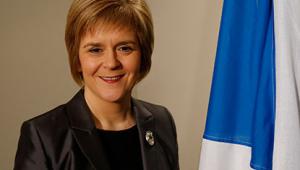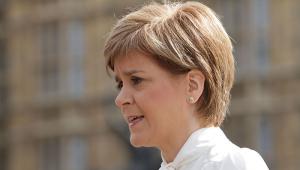Labour, the dominant force in Scottish politics for most of the post-war era, was pushed back into third place by the Conservatives, and the Liberal Democrats into fifth place by the Scottish Green Party, which trebled its tally of MSPs to six.
As the last results in Scotland’s fifth devolved parliamentary election emerged this morning, they confirmed that the proportional mechanism designed to prevent overall majorities had functioned better than in 2011, and ensured that the SNP’s dominance of the constituency seats, where it won 59 of the 73, was offset in the regional top-up lists, where it scored 12 fewer seats than last time.
That left Sturgeon two seats short of the 65 she needed to retain an overall majority, and she must now decide whether to head a minority government doing deals on an issue-by-issue basis, or seek some sort of partnership with another party, almost certainly the pro-independence Greens.
Two issues would be likely to dominate any such talks: tax and fracking. The Greens fought the election on a policy of using Scotland’s new income tax powers aggressively in order to create a more progressive anti-austerity fiscal regime north of the border, whereas Sturgeon limited the SNP’s plans to a promise not to replicate Chancellor George Osborne’s tax cut for higher rate payers.
Compromise might be easier on local taxes, where Greens want to replace the council tax (which the SNP is restructuring but retaining) with a shift towards site value taxation; and on fracking, where many in the SNP would like to see Sturgeon’s current moratorium hardened into a formal ban.
All the parties except Labour can draw some encouragement from the election outcome. The SNP, which fought largely on its record in government, appears to retain the confidence of voters, and victory will be further sweetened by replicating last year’s improbable UK election feat of scoring a clean sweep of the Glasgow constituencies, once Labour’s most impregnable electoral fortress.
For the Tories, long considered toxic in Scotland, a net gain of 16 seats taking them to 31 represents a major advance. They fought the election largely on the personality of leader Ruth Davidson – the party name barely appeared on their campaign material – but also on the promise to stand up to the SNP as a more effective opposition than Labour at Holyrood.
Holyrood does not recognise an official opposition in the Westminster sense, but the strategy focused increasingly on a pledge to fight any attempt by the SNP to stage a second independence referendum – a prospect on which Sturgeon has urged her party to exercise patience.
There is strong evidence of pro-Union tactical voting in the constituency contests, which not only boosted the Tory vote but also gave the Lib Dems some unexpected constituency wins – notably party leader Willie Rennie in North-east Fife – though their overall tally stalled at five MSPs. It may also have helped a few Labour figures, like former leader Iain Gray, see off SNP challenges.
Labour leader Kezia Dugdale, knowing how viscerally many traditional Labour supporters resented the party’s sharing of a platform with the Tories in the pro-Union Better Together referendum alliance, sought to move the debate on from the constitutional question and focus instead on issues like raising income tax to pay for more spending on education.
This strategy failed, proving – as does the SNP’s continued success - that the constitutional question remains the defining issue in Scottish politics 20 months after the referendum. Labour, which dominated the constituencies in the early years of devolution, had to rely on the lists to deliver its 24 MSPs, 13 down on the previous total. Dugdale has said she intends to remain as leader.
In Wales, Labour will to remain the largest party in the assembly after winning 29 of 60 seats, falling just short of a majority and also down one from the 2009 result. Plaid Cymru won 12 seats, up one, to move into second place from the Conservatives, who won 11, down three. UKIP won its first ever seats in the assembly, scoring seven in the regional votes, while the Liberal Democrats will have a sole assembly member, down four.
Counting is underway for the Northern Ireland Assembly elections, which did not count overnight.




















